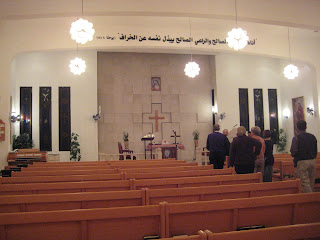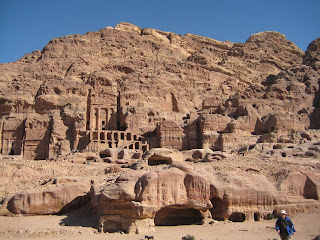 Mark Holman, of the ELCA, is the pastor of the English-speaking congregation of the Lutheran Church of the Redeemer in the Old City in East Jerusalem. His wife Marcia and he arrived from Minnesota a month before us to begin a four-year term here in this position. This was Mark’s sermon given on Sunday the 23rd, the Fourth Sunday in Advent. As the four of us have had the same reactions to what we have been experiencing, we felt that he expressed our feelings so well. Mark has kindly given us permission to include his message in our blog.
Mark Holman, of the ELCA, is the pastor of the English-speaking congregation of the Lutheran Church of the Redeemer in the Old City in East Jerusalem. His wife Marcia and he arrived from Minnesota a month before us to begin a four-year term here in this position. This was Mark’s sermon given on Sunday the 23rd, the Fourth Sunday in Advent. As the four of us have had the same reactions to what we have been experiencing, we felt that he expressed our feelings so well. Mark has kindly given us permission to include his message in our blog.There is a columnist who writes for my favourite newspaper. I don’t often share this writer’s opinions, but I respect his views and appreciate his writing style. David Brooks, writing in this week’s NY Times, was commenting on the front-running candidates seeking their party’s nomination for President of the U.S. I won’t address the political issues here, but I do want to lift up one of Brooks’ apt images.
He sounds a warning to us and to the candidates. He says that Presidents are too often buffeted by over-the-top flattery, criticism and betrayal. They become isolated and exposed. They are, as he says, “puffed up on the outside and hollowed out on the inside.” It is that image of being puffed up on the outside and even more being hollowed out on the inside that’s been rattling around in my soul.
For the image is not only apt for international leaders – but it is apt for our celebration of Christmas … and the living of our lives…. as well.
I suspect you have already received many greetings from friends and family. Sometimes they come by mail – more often by email. With many of these greetings (especially to those of us who will celebrate our first Xmas here in Jerusalem), the disconnect between what people think we are experiencing – and what we are actually experiencing is amazing.
Sometimes it is amusing – and sometimes it is sadly serious. Here & now, in the age of instant communication, it is staggering to realize how mis-informed so many bright people are.
Let me illustrate – This week Marcia and I heard from a dear friend, Betty, and she gave expression to similar sentiments we have heard from others. Betty wrote, “What is it like to BE in the area where Jesus was actually born? I just cannot imagine how incredible it has to be!!! Are there many celebrating his birth with you? Is there much opportunity to witness the Gospel to those not sharing the Christian faith? How is Christmas celebrated there? … (IN CONCLUSION) May the Jesus whose birthday we celebrate – touch your hearts and souls like never before.”
Betty is a wonderful and loving friend and I don’t mean to dismiss – for a second – the sincerity of her greeting. But, what she imagines it’s like here – and what it is really like, is quite different.
We also received a note from David, a former classmate, recent Bishop’s assistant and now serving as Sr. Pastor for one of the largest Lutheran churches in Ohio. “I took my first (and only) trip to Israel just 2 years ago and was really moved by the trip. It was sponsored by the Cleveland Jewish Community Federation and included Christians and Jews; we met with Palestinian and Jewish leaders, but it was mainly looking at the political situation from the Jewish viewpoint. This Christmas will be so different for you, probably in every way, unless you keep some of the food traditions!"
I am quite certain that David’s tour did not include Bethlehem – the place we go tomorrow – the place of the Saviour’s birth. Many tour groups of the type he was on, understand Bethlehem to be a forbidden place, a place of danger. You just don’t go over there to visit the birthplace of the Prince of Peace.
Now, there is nothing wrong with the views of Betty and David and people within your circle of friends and family. It simply shows that we all have a lot to learn. For everyone of us, learning is a life-long task. And for us, we have the particular opportunity and responsibility to teach – not only current events – but, what we are coming to know as Christmas in this place, this dark place of the Savior’s birth.
In many ways Xmas gets so puffed up and hollowed out that it is hard to see anything of the simplicity, natural loveliness, holiness and the raw earthiness of that moment when God became flesh – Emmanuel – flesh to dwell among and save people like you and me and ALL people.
Perhaps the ultimate puffery is demonstrated in the “living nativities” that seem to be the current rage in some of the largest mega churches. Right after Thanksgiving, Travis visited one such living nativity near Chicago:
“That night I and a couple of thousand others were enthralled by the spectacular staging of the beautiful and inspiring story of the first Christmas told reverently in pageantry, music, and scripture. It featured multiple-set tableaus, live animals, and swelling musical orchestration; but perhaps the most notable component of this particular scene, as I observed was in the audience’s response to it. As soon as the curtain pulled back to reveal the full set of the nativity, the stage began to sparkle with the strobing flashes from countless digital cameras. It was the one and only point at which the audience was willing to transgress the venue's explicit rule to not take flash photos. Suddenly, the stage lights came up and the beautiful Xmas story unfolded. It was almost as if we were there."
When the story of the nativity is PUFFED UP in a full multi-media extravaganza, it is hard not to feel a bit hollowed out. It happens a lot – the puffing, that is – this time of the year, and understandably; it is the greatest story ever told. But, when you try to square all of that with the first pitiable stable with its cold-stone manger, and its young Mary and bewildered Joseph, it’s hard to put it all together.
And, tomorrow, when so many will walk through checkpoints and then pass through the awful “Wall” – it will be hard to imagine that this is the birthplace of the King of Kings, the Lord of Lords, the Prince of Peace. With that disconnect, many of us might be feeling more than a bit hollowed out. But, that’s okay. In fact, it is a good place to be to celebrate Xmas and consider its meaning for your life.
Think of old Joseph. If anyone had the feeling of being hollowed out, it was him…His betrothed, Mary, was pregnant. That could only be viewed as a terrible shame, a tragedy. For Joseph, it would be hard to image anything worse. Incredibly, though, he had enough…What? Integrity? Love? Compassion? Matthew calls it righteousness… Anyway, he had enough of it to quietly dismiss Mary – and very possibly save her life if not her reputation. There was nothing puffed about old Joseph. He was hollowed to his core. The only thing that was left was his honourable plan.
Today’s gospel tells us that it may be okay to be hollowed out. It’s an okay place to celebrate Xmas. It’s an okay place to consider what you are doing with your life, and what values guide it. When something – or someone – is hollowed, there is new space created.
For Joseph, God entered the hollow and gave him something so much better than his noble and well-conceived plan. God gave purpose and mission.
For those going to Bethlehem on Christmas Eve tomorrow, God can enter the hollow and give something so much better than even the loveliest live nativity in Chicago. God can give deepened faith through the flickering of a candle or through a familiar carol heard again “for the first time”.
For those of us in the late-stages of crafting a new plan for our own lives, we may be surprised (like Joseph) that God has a different (and better idea.) This year, let’s step aside from the stuff that puffs up Xmas – it’s really not necessary. But let’s step toward – even embrace – the experience of being hollowed out. The Saviour of the world wants to be born in that sacred space...






















































